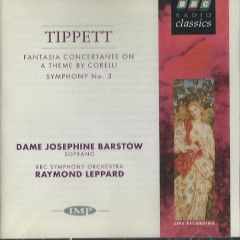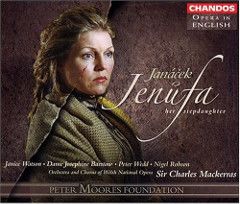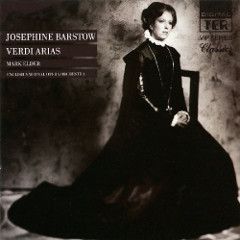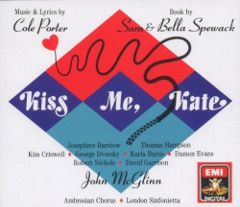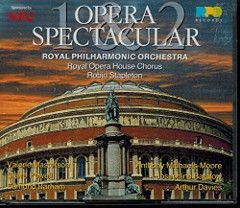Dame Josephine Barstow is recognised as one of the world’s leading singing actresses. During a long career she has performed in most of the world’s major opera houses and with many of the great conductors singing a varied repertoire of Verdi‚ Richard Strauss‚ Puccini and Janácek among others.
Recent and forthcoming engagements include Bernstein’s Kaddish Symphony with Antonio Pappano and the Orchestra Nazionale di Santa Cecilia Roma; Heidi Schiller Follies (National Theatre)‚ Countess Queen of Spades (The Grange Festival), Mme Armfeldt A Little Night Music (Opera North); Maud in the world premiere of Jack the Ripper and Mother Marie Dialogue of the Carmelites (ENO); Countess Queen of Spades and Lady Billows Albert Herring with Opera North and at the Birgitta Festival‚ Tallinn‚ Kostelnichka Jenufa in Oviedo and with Vlaamse Opera in Luxembourg and Mama Lucia Cavalleria Rusticana at the Teatro del Liceu in Barcelona. Engagements cancelled or postponed due to Covid include Maud Jack the Ripper at Opera North.
She began her career touring with Opera for All and studied at the London Opera Centre. She sang Euridice and Violetta for the Sadlers Wells Opera Company‚ and at Welsh National Company her roles included The Countess in Figaro‚ Fiordiligi‚ Violetta‚ Mimi‚ Amelia Boccanegra and Elisabeth Don Carlos. At English National Opera she has appeared as Violetta La Traviata‚ Natasha War and Peace‚ Salome‚ Elisabeth Don Carlos‚ Leonora The Force of Destiny‚ Leonore Fidelio‚ Jeanne The Devils of Loudon‚ Katarina Lady Macbeth of Mtsensk‚ Tosca‚ Sieglinde‚ Senta‚ Emilia Marty The Makropoulos Case‚ The Marschallin and Arabella. Her association with the Royal Opera Covent Garden began early with the Second Niece in Peter Grimes and then as Denise in the world premiere of The Knot Garden by Sir Michael Tippett‚ the young woman in Henze’s We come to the River‚ Salome‚ Ellen Orford‚ Helena A Midsummer Night’s Dream‚ Santuzza‚ Leonore‚ Alice‚ Lady Macbeth and the Countess The Queen of Spades. At Opera North roles have included Tosca‚ Marie Wozzeck‚ Aida‚ Medea‚ Lady Billows and perhaps most notably Gloriana‚ which was also filmed.
Dame Josephine has performed in Paris‚ Munich‚ Vienna‚ Bayreuth‚ Berlin‚ New York‚ Chicago‚ San Francisco‚ Houston‚ Buenos Aires‚ Hong Kong‚ South Africa‚ Japan and Australia. In 1986 she made an historic trip to the Soviet Union singing Tosca and Lady Macbeth. In the same year she appeared in the world premiere of Die Schwarze Maske by Penderecki in Salzburg. Herbert von Karajan invited her to sing the title role in Tosca with Pavarotti‚ and Amelia Ballo in Maschera with Placido Domingo. Karajan’s death meant the performances of Ballo fell to the baton of George Solti‚ although the recording had already been completed‚ as planned.
In 1985 Josephine Barstow was awarded a C.B.E. and the International Directors’ Fidelio Award. In 1995 she was made a D.B.E. Recordings include: Ballo in Maschera‚ Gloriana‚ Albert Herring‚ Kiss me Kate‚ Oliver‚ Street Scene‚ Wozzeck‚ Jenufa and The Carmelites. Films include: Gloriana – a film and Owen Wingrave.
The shift after the interval was, I feel, entirely a result of Josephine Barstow’s portrayal of the Countess, and her reminiscences of her youth and operatic successes before the French court. Quite simply, Barstow presented a masterclass in singing-acting. Barstow’s steeliness of gaze, gait and vocalism transfixed. Her delivery has a penetrating darkness with is both chilling and wonderful. She’s not afraid to spit out the Russian text at times – there’s never any loss of fluidity or musico-dramatic momentum.
Opera Today (June 2023)
And for the whole of the second half, every scene gripped us more tightly than the last. Dame Josephine Barstow sang the Countess’s reminiscences of her youth in Paris with heartbreakingly eloquent softness. The confrontations between Herman and the Countess (both living and ghostly) were chilling.
BachTrack (June 2023)
At the heart of this operatic version of Pushkin’s weird and disturbing tale is Josephine Barstow’s Countess, dominating not only her scenes as a living character but also her posthumous reappearances. With a career that began in the mid-1960s, the 82-year-old artist still has a surprisingly supple and expressive soprano at her disposal; while her silent acting – the sequence ending in her fatal heart attack, for instance, after Herman has pulled a gun on her – shows her command of physicality to be entirely intact and utterly extraordinary.
The Stage (June 2023)
It’s telling how much the mercury suddenly rises when Josephine Barstow’s Countess berates her household hangers-on and casts her mind back to glory days. The 82-year-old soprano has run down her vocal tank over the decades, but here she turns melodrama into theatre. I guessed from where her ghostly self would emerge before it happened, but the moment is still nicely done.
Times (June 2023)
The final scenes are edge-of-the-seat stuff, as the ancient Countess (Josephine Barstow) confronts her violent destiny... These three inhabit their characters down to the smallest twitch of the lips. You just knew Barstow was going to freeze time around her, and she did.
Spectator (June 2023)
Pero no todo vino del Este, porque Josephine Barstow, una veterana británica de ochenta y dos años presidió a todos estos chicos talentosos como una legendaria condesa. Sus parlandos fueron de una impostación y color formidables, en contraste con su evocativo lied en francés que cantó con un hilo de voz milagrosamente proyectado a través de una articulación perfecta. Fiel a su reconocido histrionismo actoral, Barstow protagonizó una muerte antológica por su progresión dramática: al horror inicial de descubrir a su victimario en su dormitorio, se fueron agregando los primeros síntomas de un infarto cada vez mas violento, que culminó en un expirar tan abrupto como simple. Y todo esto sin falso histrionismos o grandilocuencias, sino con una gesticulación tan sobria como intensa.
But it wasn't all from the East (the cast), because Josephine Barstow, an eighty-two-year-old British veteran, presided over all these talented kids like a legendary countess. Her speaking was of formidable setting and color, in contrast to her evocative French lied that she sang with a miraculously projecting thread of voice through perfect articulation. True to her renowned acting histrionics, Barstow starred in an anthological death due to her dramatic progression: to the initial horror of discovering her victimizer in her bedroom, the first symptoms of an increasingly violent heart attack were added, culminating in an expiration as abrupt as it was simple. And all this without false histrionics or grandiloquence, but with gesticulation as sober as it is intense.
Mundo Clasico (June 2023)
Wonderful though the leading men are, the women steal the show. Dame Josephine Barstow’s performance as Madame Armfeldt, former lover of kings and counts, is as arch, sharp and hilarious as anything you’ll find in the best Oscar Wilde production.
The Telegraph (July 2021)
Five more mature artists take the other female leads, all of them seizing every opportunity offered by their characters and the writing: especially notable are... Josephine Barstow’s terrifyingly stern procuress, Maud.
The Stage (March 2019)
Each of the Women of Whitechapel who fall victim to the killer have their moments in the spotlight and are given ample scope to inject colour and character. ENO’s starry roster of singer-actresses give these full measure – and how! ... Josephine Barstow remains a wonder, for she has lost none of her ability to present flawed, often unlikeable, characters vividly. Maud runs the doss house that forms the basis of the community of the women, but is not above procuring girls and women for her clients; her ethos is that life goes on this way and will not change, a self-fulfilling view. Barstow’s singing of Maud’s rather angular lines is remarkable.
Classical Source (March 2019)
At 78, Josephine Barstow still has the chops and more - her portrayal of a cynical old dosshouse keeper is sharply etched and vivid.
The Telegraph (March 2019)
Barstow had the only successfully reflective aria of the evening, delivered with the expressive force we know of old, revealing the damaged soul of the abuser-victim.
Opera Magazine (June 2019)
There are superlative turns from a crack ensemble cast, including a heart-stopping One More Kiss from soprano Josephine Barstow...
The Telegraph (February 2019)
The operetta style "One More Kiss", for example, with its ‘never look back' is placed exactly at the moment when all the simmering discontent of the broken relationships is about to reach a head. On opening night, as sung by original cast member, Josephine Barstow (stepping in for an indisposed Felicity Lott) and her young counterpart Alison Langer, it had a shimmering loveliness that contrasts with the emotional nihilism of the song that follows it – Janie Dee's staggering, bitter denunciation of Ben in "Could I Leave You?" which is now played on a stage empty of everything except their unhappiness.
What's On Stage (February 2019)
But Pappano has played an absolute blinder in casting Josephine Barstow in the Speaker’s role. She is tremendous and far and away the most exciting‚ the most affecting‚ the most probing narrator of any on disc. One can all too easily forget that she was an English scholar and an actress before she was a singer. She is blistering in her voicing of Bernstein’s angry confrontations with his ‘Tin God’ while the music for its part wrestles with its thorniness‚ finding respite in the central lullaby and the glorious ‘rainbow’ theme which Bernstein‚ one feels‚ knows all too well is the manifestation of his true self. But it is Barstow that makes the piece work as never before in my view and it is Pappano who should take credit for knowing all too well that she would.
Gramophone Magazine (September 2018)
...the great operatic soprano Josephine Barstow exquisitely duetting with her younger self (Alison Langer)...
Broadway World (September 2017)
Those shimmering showgirls may be lovely‚ but their real‚ bruised‚ sagging selves are far finer. We feel it in Di Botcher’s ironic belting out of “Broadway Baby”‚ Tracie Bennett’s defiant growl of “I’m Still Here” and‚ most touchingly of all‚ in Josephine Barstow’s quavering duet with her younger self‚ “One More Kiss”.
Financial Times (September 2017)
Veteran opera singer Dame Josephine Barstow provides the best moment of the Royal National Theatre’s make-or-break autumn musical – a revival of Stephen Sondheim’s bitty Follies.
The Daily Mail (September 2017)
Josephine Barstow duets poignantly with Alison Langer...
The Evening Standard (September 2017)
In a 37-strong cast there also striking contributions from Josephine Barstow as a throwback to old Vienna...
The Guardian (September 2017)
...the ecstatic operetta duet “One More Kiss” by the great classical soprano‚ Josephine Barstow‚ making her NT debut at 78...
The Spectator (September 2017)
There’s Josephine Barstow and Alison Langer’s duet as old and young Heidi‚ joining their two operatic soprano voices with crystal clarity.
The Stage (September 2017)
Josephine Barstow makes "One Last Kiss" a soaring ballad of longing.
What’s On Stage (September 2017)
Each character comes alive without exaggeration or caricature. The veteran Josephine Barstow is the suitably regal Lady Billows
Financial Times (May 2013)
...there is the visceral thrill of such uncommon proximity to Josephine Barstow‚ whose censorious Lady Billows could best be described as the parish version of her landmark performance in Opera North’s production of Gloriana – the virgin queen reincarnated in twinset and pearls
The Guardian (May 2013)
In fact‚ I doubt whether the blending of voices and matching of vocal and physical characteristics in this handpicked cast could have possibly been bettered. The sole survivor from Opera North’s 2002 production is the inimitable Dame Josephine Barstow as Lady Billows...The role of Lady B is a big sing with a high tessitura up to top As and B flats (lots of them). And sing Dame Josephine emphatically does - with incredible agility and colouring of words; her unmistakeable voice is in wondrous form‚ long may she continue...I loved the expression on Barstow’s face and the sheer sense of revulsion with which she infused the words "Sodom and Gomorrah" to describe the state of moral turpitude into which her beloved village of Loxford had descended - alone worth the price of a ticket!
Opera Britannia (May 2013)
...the audience get close to the great Dame Josephine Barstow‚ who as Lady Billows will be a draw for many. She’s still marvellous – you fear early on that her larger-than-life theatrics will cast a shadow over a hard-working supporting cast‚ but she wisely keeps things just enough in check...you can’t imagine this piece being better performed
The Arts Desk (May 2013)
...if Havergal’s show lacks visual splendour it has buckets of energy and zestful acting. No surprise there‚ with the stage full of characterful veterans: Josephine Barstow’s despairing Lady Billows‚ detecting moral decay all around...
The Times (May 2013)
...with Josephine Barstow as Lady Billows‚ the grande dame of Loxford village‚ there is always the danger that the rest of the cast will be acted off the stage. But this lively and engrossing new production by Giles Havergal is cast from strength...Barstow is the epitome of an ensemble player...Kept exactly in the Edwardian period Britten intended‚ this comes very close to being the Albert Herring of one’s dreams‚ its teamwork exemplary. It should not be missed
The York Press (May 2013)
The cast overall is the finest we have seen in UK productions over the past thirty years...Josephine Barstow presenting a formidable Lady Billows
Yorkshire Evening Post (May 2013)
...a great singing actress...Rarely does the Countess dominate Tchaikovsky’s opera so decisively. Less the addled former beauty than a great seductress in bitter revolt at the ignominy of decay‚ there’s a touch of cabaret in Barstow’s singing. The air from Grétry’s Richard Coeur-de-Lion is delivered pianississimo. Every glance is steeped in ennui‚ every sip of champagne an expression of contempt towards the gauche boobies that surround her. The orchestra‚ under Richard Farnes‚ which starts with a great sigh of anguish‚ ignites when she is centre-stage
Independent on Sunday (November 2011)
Josephine Barstow’s performance as the ‘Queen of Spades’ had a dramatic intensity and vividness which by far outshone the rest of the cast. Whether scowling at her servants‚ scolding them for their prattling‚ or vamping it up as the Countess’ ghost in Act III‚ Barstow drew the eye and the ear time and again...Stealing the limelight at every turn‚ Barstow snapped and scowled convincingly‚ her utter disdain for everything and everyone around her palpable. Much of her delivery was parlando‚ her voice brittle and uneven. Yet she was utterly mesmeric in her portrayal. In Act II‚ when she sings a Grétry aria (from Richard Coeur-de-lion)‚ Barstow scales down her voice to a spellbinding pianissimo which gripped the audience into silence
Opera Britannia (November 2011)
The Countess‚ played by Dame Josephine Barstow‚ was brilliantly portrayed. For Downton Abbey fans think an imperious Maggie Smith. In Act II scene 2 she is confronted by Herman in her bedroom as he seeks the secret of the three cards. It was unsettling and unnerving as the two characters were so haunted‚ the Countess by her past and Herman by his obsessions
Opera Britannia (November 2011)
...the sheer charisma of Dame Josephine Barstow as the Countess... When Barstow’s Countess was on stage‚ as a live and kicking drinking madam or‚ most significantly‚ as she died of shock at Harman’s intrusion to her bedroom‚ and then‚ magnificently‚ as she returned as a ghost‚ she dominated proceedings
Seen & Heard International (November 2011)
Barstow sang her Grétry aria‚ ‘Je crains de lui parler la nuit’ (borrowed by Tchaikovsky from the opera Richard Coeur-de-lion) with esurient flamboyance and then luxuriated in the barely-audible reprise. The scenery may have been raw MDF but that didn’t stop Barstow from chewing it up
Classical Source (November 2011)
It is left to Dame Josephine barstow to steal the evening witha bravura display of anguished arrogance as the Countess
The Express (November 2011)
...the sheer charisma of Dame Josephine Barstow as the Countess and the dramatic balance was adrift somewhat. When Barstow’s Countess was on stage‚ as a live and kicking drinking madam or‚ most significantly‚ as she died of shock at Harman’s intrusion to her bedroom‚ and then‚ magnificently‚ as she returned as a ghost‚ lacking in requisite spookiness though that scene was‚ she dominated proceedings
Seen & Heard International (November 2011)
Dame Josephine Barstow’s Countess‚ the possessor of the three cards‚ was a radically rethought interpretation which pulled the tussle between age and beauty into thrilling focus
The Arts Desk (November 2011)
Sometimes a single performer can turn an otherwise unexceptional evening into a memorable one. Such is the case with Josephine Barstow in Opera North’s staging of The Queen of Spades. Tchaikovsky’s opera has had a good run in the UK these past two decades‚ but no recent interpreter of the Countess has explored this pivotal role to such rich effect. Now in her seventies‚ Barstow seems a throwback to a different century in her outsize performance of the decrepit old aristocrat. What distinguished her was her acting‚ her stage presence‚ her use of words to add depth to a role – qualities she now focuses on a character that‚ in her hands‚ spans age and agelessness‚ vanity and vulnerability‚ the domineering and the revolting. With an array of wigs that make her glamorous one moment‚ geriatric the next‚ she draws the audience into the Act Two bedroom scene with a blend of half-voices and whispers – telling us that Barstow‚ like the Countess‚ is as keen as ever to stay in the game
Financial Times (October 2011)
Barstow‚ famous for her Elizabeth I in Gloriana‚ showed she can still dominate a stage. Her imperious "Stop that prattling"‚ directed at her gossiping womenfolk‚ made the entire audience bristle to attention
The Guardian (October 2011)
And then there was Dame Josephine Barstow as the aged Countess. She has lost none of her stage magnetism. She veered between sentimental recollections and imperious irritability‚ and in the bedroom scene her quiet singing was utterly magical. This scene‚ in which Herman tries to extract from her the secret of her winning three cards‚ is one of the great scenes in all opera‚ and it did not disappoint.
The Independent (October 2011)
The Countess‚ played by Dame Josephine Barstow‚ was brilliantly portrayed
Opera Britannia (October 2011)
...a standout. Dame Josephine Barstow’s Countess seizes every opportunity in sight. Instead of the usual vision of a helpless old lady‚ Barstow presents a figure still holding onto her glamour - svelte and alluring‚ she judges every gesture with immaculate artistry
The Stage (October 2011)
What dominates the concept is Josephine Barstow’s strikingly powerful incarnation of the Countess. Now over 70‚ but still with voice and figure intact‚ Barstow presents the character as a glamorous‚ tempestuous diva‚ more Gloria Swanson than Edith Evans and still craving the drug of male admiration. In the final scene‚ she appears as a ghostly platinum blonde vamp and makes it clear that she regards Herman not so much as her murderer as her sexual conquest
The Telegraph (October 2011)
Best of all is Dame Josephine Barstow’s turn as the countess. She’s still effortlessly charismatic‚ her voice largely intact as she enters her eighth decade. Even when she’s tucked away at the side of Act II’s crowded ballroom scene‚ you can’t help staring at her. And to see her near the end of the same act minus wig and ball gown is a chilling moment. The voice dies down to a whisper‚ and the audience is silent
The Arts Desk (October 2011)
This leaves the show in the hands of the secondary roles‚ one of them a standout. Dame Josephine Barstow’s Countess seizes every opportunity in sight. Instead of the usual vision of a helpless old lady‚ Barstow presents a figure still holding onto her glamour - svelte and alluring‚ she judges every gesture with immaculate artistry.
The Stage (October 2011)
A muy buen nivel todos los personajes secundarios‚ incluida Dame Josephine Barstow‚ que‚ a sus 70 años cumplidos‚ le dio más prestancia y carácter que voz a su personaje de Mamma Lucia
El Pais (April 2011)
The equally marvelous Josephine Barstow returns to the part of Mother Marie of the Incarnation‚ the assistant Prioress...her character really shows its complexity‚ and she is still a marvel to watch on stage.
Music OMH (October 2005)
Dame Josephine Barstow once again graces the London stage with her flawless portrayal of Mother Marie
Stage Online (October 2005)
There were vivid performances from...Josephine Barstow as a potent Mere Marie.
The Telegraph (October 2005)
Dame Josephine Barstows Kostelnicka is one of the finest recorded accounts of the role‚ in any language‚ and her sung English diction is generally a model of clarity as well. Her confession near the end of the opera is unforgettable‚ as is the spine-chilling malevolence with which she sings in the great closing scene of Act 2.
International Record Review (July 2004)
She sounds in good form for a soprano approaching her 63rd birthday‚ deeply moving in her plea to Peter Wedds feckless Steva and terrifying in her emotional collapse at the close of Act II. Fans of the veteran soprano will be glad to have this performance preserved on disc.
Sunday Times (July 2004)
Josephine Barstow is on refreshingly firm vocal ground in a classic interpretation of the Kostelnicka.
The Telegraph (July 2004)
Barstow returns to the role three years on with undimmed splendour. Whether flaunting her regality in the public court scenes‚ displaying her more womanly emotions in response to Essexs lute song‚ or attracting sympathy in the latter stages as the hunched‚ balding figure in her private chamber‚ she rivets the attention. This is a tour de force of theatricality- aided by Phyllida Lloyds immensely perceptive and resourceful staging- as much as of vocalisation‚ although Barstow is never less than magnificent in that department too. Commanding and precise‚ her tone and diction are as regal as her demeanour; even when stripped of her regalia‚ you know this is no ordinary woman whose chamber has been burst into. With Barstow at the centre it (the production) touches greatness.








